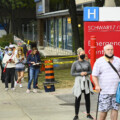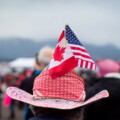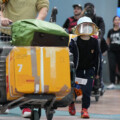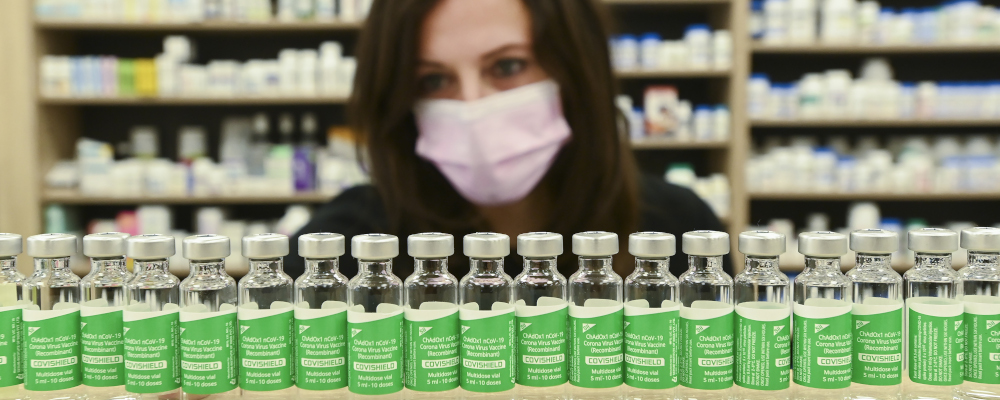Democracy is all about allowing citizens to enjoy enshrined freedoms of choice and freedom of movement.
China rapidly curtailed the initial outbreak of COVID-19 infection by isolating Wuhan and imposing harsh penalties for disobedience. Facial recognition and closed circuit cameras were and still are routinely used to track people’s movements and compliance with government will. Communist and other authoritarian countries encourage people to monitor and disclose unwelcome behaviour by friends and neighbours. They can force their will on their population. Canada is very different, we will have to convince people to be vaccinated.
Mass vaccination is essential to curtailing the devastating effects of COVID-19 to our personal health, the health care system, our economy and our national psyche. We routinely accept that if you want to drive you have to pass a test and get a licence. You also have to wear a seatbelt since it clearly saves lives. Children have to be schooled and get a basic education. You don’t have the freedom to sell illegal or dangerous products, unless of course they are taxed by the government like cigarettes. You do however retain the freedom to make personal medical decisions.
The World Health Organization estimates that vaccines prevent 2-3 million deaths a year by protecting people from dying of hepatitis, measles, diphtheria, cervical cancer, pneumonia, tetanus, polio, diphtheria and whooping cough.
There is an important difference between vaccine hesitancy and extreme vaccine deniers. Vaccine deniers believe no vaccine is safe, that paediatric vaccination causes autism, that vaccines will change your DNA and that toxic additives cause more long term harm than any exaggerated benefits of vaccination. The lack of any true scientific basis for these claims doesn’t shake their belief. They are highly unlikely to accept vaccination for COVID-19.
The shaming and blaming of those uncertain about vaccination only makes their refusal more entrenched.
Vaccine hesitancy is much more common and has many more superficially reasonable arguments.
The largest group who are hesitant are those whose political views colour their decision to decline vaccination. Up to 40 percent of Republicans indicate they will decline vaccination, especially older white men. The polarization of the last U.S. election makes them underestimate the risks of infection just as many Democrats may overestimate what is truly a considerable risk.
The higher risk for people of colour, essential workers and those in a lower economic class makes many older white men feel less at risk. The shaming and blaming of those uncertain about vaccination only makes their refusal more entrenched. Their hesitancy can best be overcome by those they respect continuing to emphasize the benefits of vaccination. Unfortunately it often won’t come from sensible words from Dr. Anthony Fauci whom they see as someone restricting their freedoms.
In Canada there is much less political polarization but it still exists.
Hesitancy by people of colour distrustful of government and religious groups uncertain of benefit or convinced that God alone will protect them has been blunted by wise words from peer groups, trusted physicians and counsellors.
There is also a divide based on age and personal risk. In Israel, over 90% of those over 60 have accepted vaccination and 99% of those above 90. In Canada those over 60 aren’t vaccine hesitant. They know their risk and want to reduce it as quickly as possible. Their fury is directed at the inept procurement of vaccines and the resulting need for a 16-week delay between shots.
Many younger, healthy people reasonably believe that if infected they are highly unlikely to die and question why they should take any risk of vaccination. This concern is magnified by the hyping of rare complications, fear of needles and the belief that natural treatments rather than vaccines from mistrusted big Pharma are the answer.
Our population is becoming less vulnerable as more at-risk individuals are protected. That protection may wane if we wait too long between shots, but for now mortality from COVID-19 is well below 1 percent. What needs to be emphasized is that with the dominance of variants of concern, becoming infected conveys a higher risk of bad outcome even for young and healthy people. Many will also have months long symptoms of fatigue and sensory abnormalities that limit quality of life.
While Canada may not have formal vaccine passports, many restrictions will be imposed on those not vaccinated.
We need to reach about a 70 percent level of vaccination to achieve relative herd immunity. Otherwise we will continue to have a reservoir of unvaccinated people that can get infected with newer variants not yet widely circulating that could pierce vaccine immunity for others. Vaccines have not yet been approved for children under 16 who represent more than 20 percent of the population. We therefore have to convince many hesitant younger people that our future safety depends on their compliance for the benefit of others, even if they are not fearful for themselves.
Those vaccine hesitant also need to see a benefit beyond disease prevention. While Canada may not have formal vaccine passports, many restrictions will be imposed on those not vaccinated. The ability to travel to other countries, enter the workplace, cruise, fly, enjoy indoor venues, and to have others feel safe in their presence will all rely on vaccination.
It will be important to not overly restrict those who are vaccinated with excessive quarantines and restrictions based on the minimal chance of harbouring infection. A major benefit that will overcome hesitancy will be the ability to take off masks to enjoy outdoor activities and to increase congregation. People desperately want to resume a better quality of life and vaccination is the way to do so.
We can’t force people to be vaccinated just because it is to the benefit of society. We don’t shame or exclude people who are obese, unfit, smoke or don’t exercise, even though their unhealthy behaviour taxes our health care system. Overcoming vaccine hesitancy in a democracy will take patience, honest information about the risk-benefit of choices and the advice of trusted friends and advisors. Some people will overcome their fear for altruistic reasons and others because the alternative is less attractive.
We greatly value our freedom of choice even if those choices seem unwise to many. Those who are vaccine hesitant need to be convinced that with vaccination they will enhance their freedom to be both healthier and free.
Recommended for You

Daniel Zekveld: Age verification for pornography is not government overreach

Colin Craig: A roadmap to more choice in health care

Canada outperforms the U.S. on many well-being measures—yet on the important economic indicators, we are falling far behind

‘Enormously expensive and very narrow’: Kevin Quigley on Canada’s precautionary response to COVID-19



